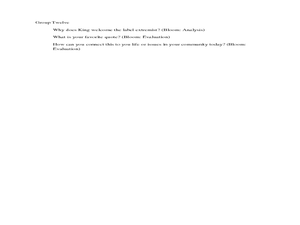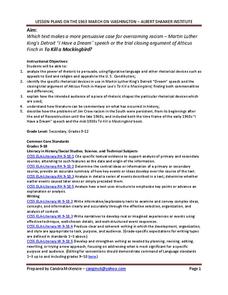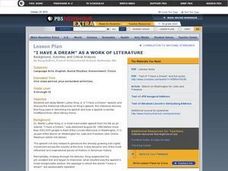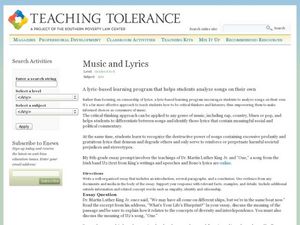K20 LEARN
The Power of Poetry: Perspectives in Poetry
What do Abraham Lincoln, Dr. Martin Luther King, Jr., and Amanda Gordon have in common? They all believe in the power of words—the power of words to create change. After analyzing the rhetorical strategies in several poems and speeches,...
Curated OER
Martin Luther King, Jr.
Fifth graders discuss the importance of Martin Luther King, Jr. and reflect on civic responsibilities. They brainstorm ways in which they can help to fulfill Martin Luther King, Jr.'s dream of equality among all people. Students write...
Curated OER
Reconsidering Malcolm X
Students analyze the strategies and speeches of Malcolm X and Martin Luther King, Jr.
Curated OER
Reading: I Have a Dream: Speech by the Reverend Martin Luther King, Jr. in Washington, D.C. on August 28, 1963
In this future time reading comprehension worksheet, students read an excerpt from "I Have a Dream" and then respond to 3 multiple choice questions.
Albert Shanker Institute
Dream Under Development
As part of their study of the 1963 March on Washington, class members do a side-by-side comparison of the original text of Martin Luther King's "I Have a Dream Speech" with a transcript of the speech he delivered. The take away from the...
K20 LEARN
Watch Your Tone: Tone Analysis Through Music And Nonfiction
Identifying the tone of a piece of writing or the author's attitude toward the subject matter can be difficult for learners. Simplify the process with a lesson that begins with skits, moves to songs and their lyrics, and then to passages...
Curated OER
King Campaigns in Birmingham
Eleventh graders discuss the contributions of Reverend Martin Luther King, Jr. In this civil rights movement lesson, 11th graders read Rev. King's "Letter from Birmingham Jail", answer questions about the letter, share their answers...
Albert Shanker Institute
Making the Case for Equality: A Comparison
Martin Luther King Jr's " I Have a Dream" speech and Atticus Finch's closing argument during the trial of Tom Robinson both address the societal need to overcome racism. After examining the rhetorical devices and figurative language used...
Curated OER
Leaders of the Past
Fourth graders read a story about the life of Martin Luther King Jr. and summarize the story by filling in the blanks about his life on a storyboard handout. They listen to the "I have a dream" speech and write about how they feel life...
Curated OER
Freedom Fighters
High schoolers discover the accomplishments of Nelson Mandela and Martin Luther King, Jr. In this social justice lesson, students watch "Freedom Fighters," and then read speeches or writings made by each of the men. High schoolers write...
Curated OER
"i Have a Dream" As a Work of Literature
Students read and analyze Martin Luther King Jr.'s "I Have a Dream" speech. They answer discussion questions, and write and compose a speech that addresses an injustice in society.
Curated OER
"I have a Dream"
Students analyze the famous "I Have a Dream," speech by Martin Luther King Jr., and discuss the progress made since then. In small groups, they read and discuss various documents, and formulate a plan of action to help realize Dr. King's...
Curated OER
I Have a Dream...
Students explore the dream of Martin Luther King, Jr. In this civil rights lesson, students utilize their computer skill as they compose "I have a dream" statements.
Curated OER
I Have a Dream
Students use flip video cameras to film a speech about the 'I Have a Dream' speech. In this poetry and speech lesson, students listen to the speech from Dr. Martin Luther King Jr. Students memorize part of the speech.
Curated OER
Who’s Got Rights? An Introduction to Human Rights and Human Rights Defenders
High schoolers explore human rights issues. In this social justice instructional activity, students examine human rights as they read segments of the "Universal Declaration of Human Rights," discuss photographs with human rights...
Curated OER
A Raisin in the Sun: Vocabulary Bingo
Students study A Raisin in the Sun. Students study new vocabulary through a game of bingo. Martin Luther King Jr.'s speech "I Have a Dream" as a supplementary text. Students create their own bingo cards.
Curated OER
Write Your Own "I Have a Dream" Speech
Students listen to King's famous "I Have a Dream" speech. They use a fill-in-the-blanks worksheet to express their dreams for the world in a format similar to King's speech.
EngageNY
Close Reading: The Montgomery Bus Boycott Speech
How did Martin Luther King, Jr. sway people with his speeches? Scholars carry out a close reading of the Montgomery Bus Boycott speech and use the Close Reading Guide to help them work through the powerful text. While reading, they...
Academy of American Poets
Teach This Poem: "Imagine" by Kamilah Aisha Moon
A lesson about Kamilah Aisha Moon's poem "Imagine" asks young scholars to imagine, "What would happen if...?" If Dr. Martin Luther King's dream became a reality. If Renisha McBride was a white girl and crashed her car in a black...
Prestwick House
Rhetorical Devices in Political Speeches
Have you ever watched a political speech and felt your heart beat a little faster, and your opinion either solidify or begin to slightly change? Rhetorical devices can be a strong tool in an effective and powerful speech. A short lesson...
Curated OER
Digital Dreams
Young scholars write a speech. In this dreams lesson, students define the word dreams and list their own dreams. Young scholars read and discuss Langston Hughes work, read and discuss excerpts from speeches by JFK and Martin Luther...
Curated OER
Music and Lyrics
Eighth graders analyze lyrics from songs from a variety of genres. In this musical analysis lesson, 8th graders write an essay about their life plans in which they discuss the lyrics of U2's song, "One." They tell how the writings of Dr....
Curated OER
"I Have a Dream" T-Chart
In this Dr. Martin Luther King, Jr. "I Have a Dream" speech worksheet, students identify dreams and actions called for as they read or listen to the speech. Students complete a T-chart.
Curated OER
Adding to the Picture: The 1963 March on Washington
Who do your scholars imagine when they think about the civil rights movement? If only a few faces come to mind, this lesson will expand their concepts of the movement's leaders. Learners examine an image of the 1963 March on Washington,...

























